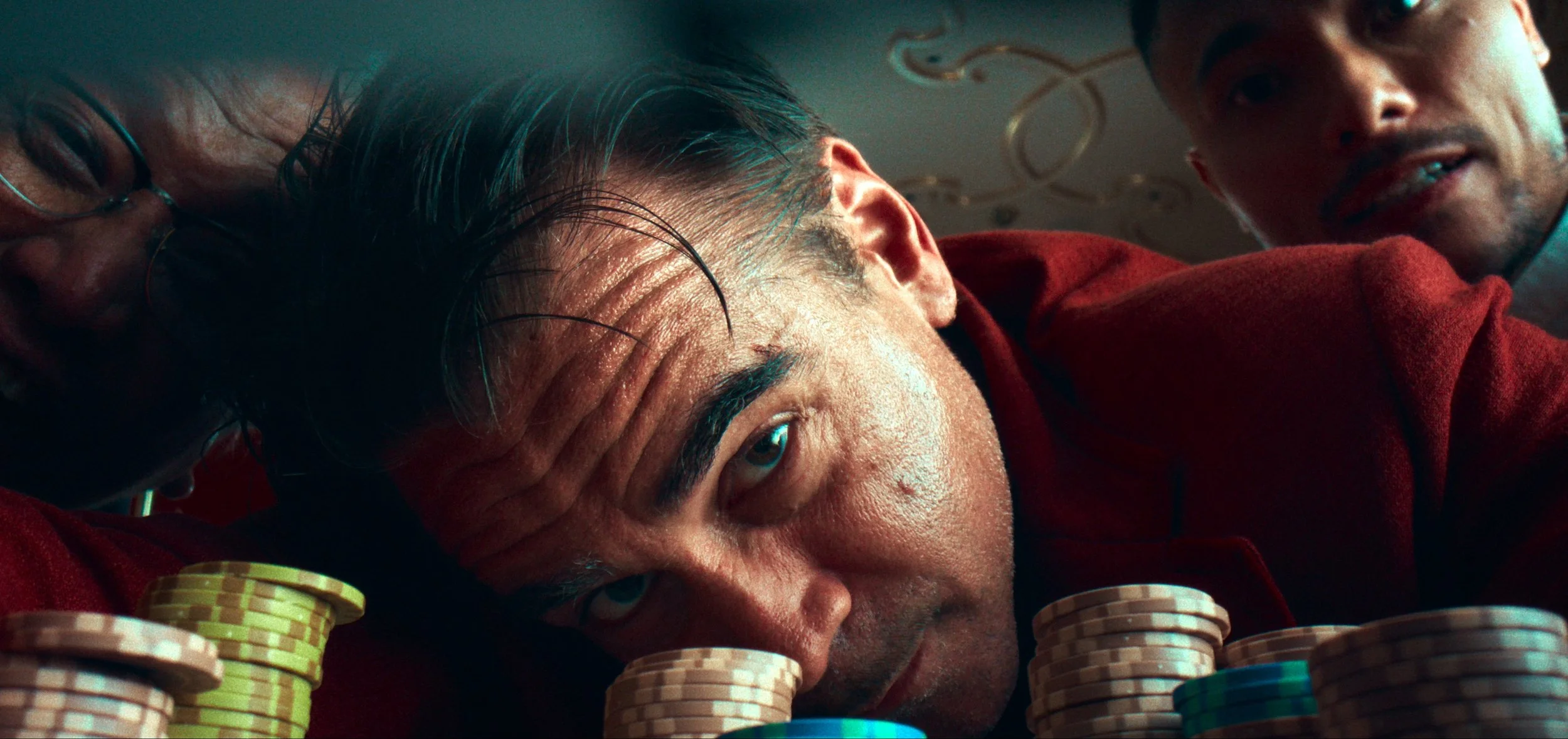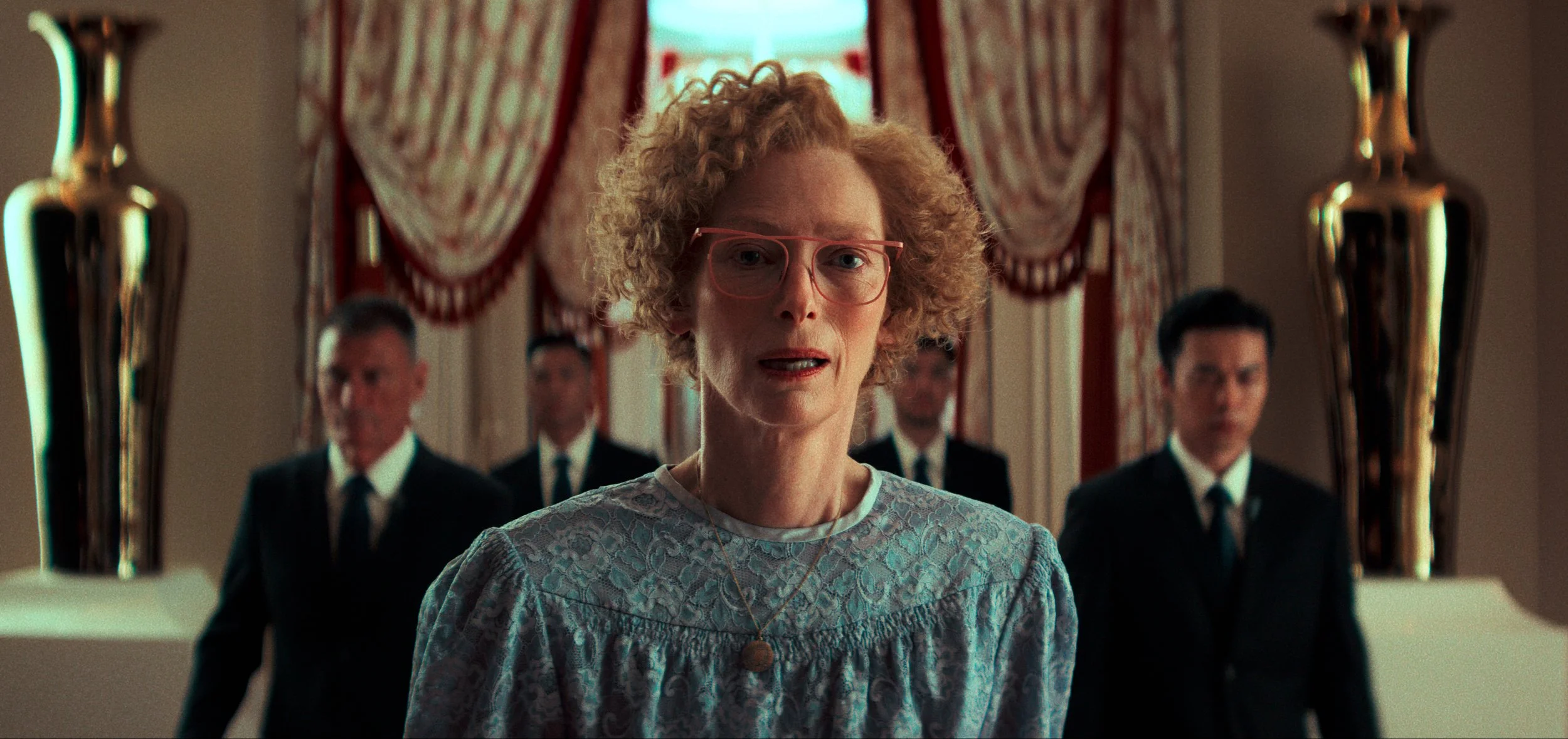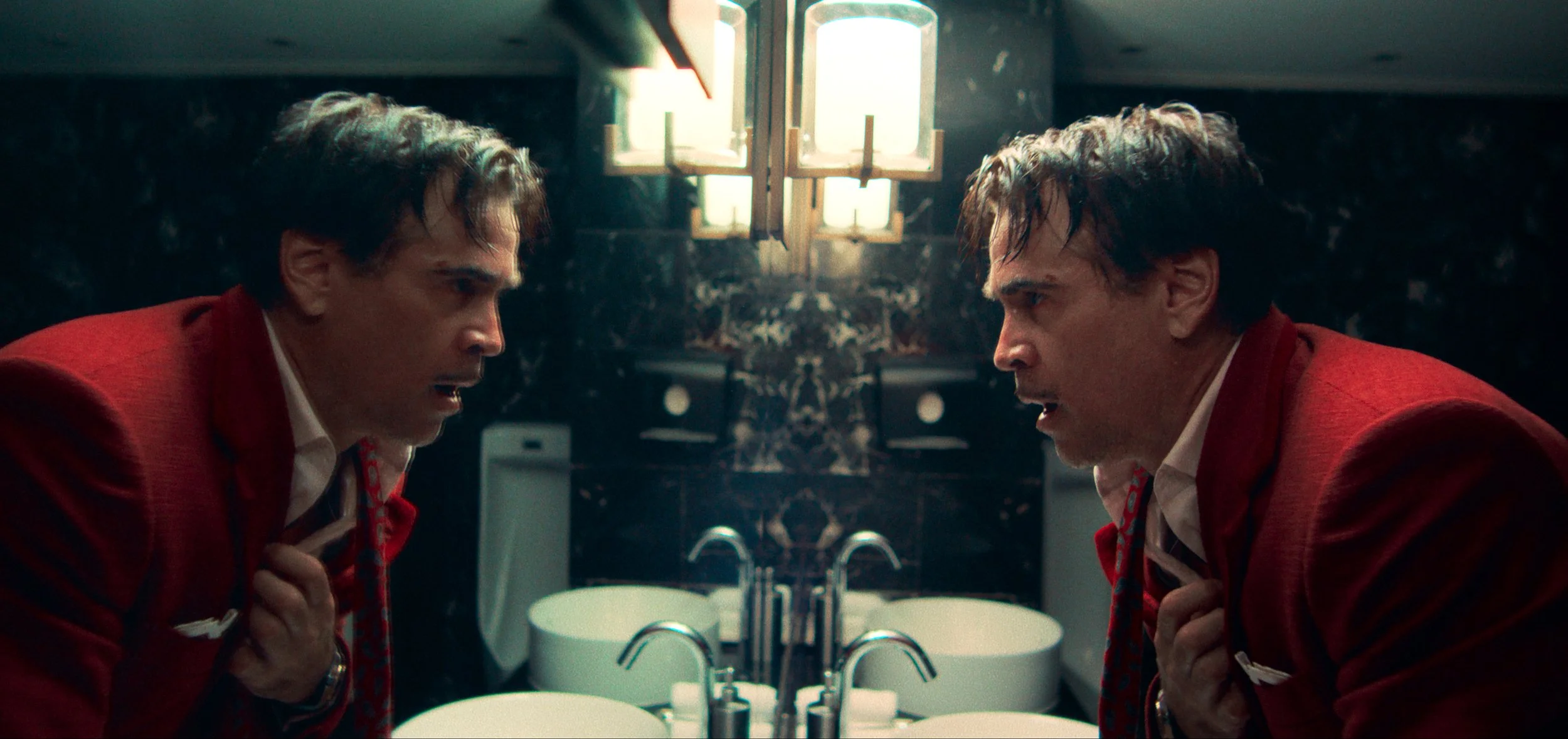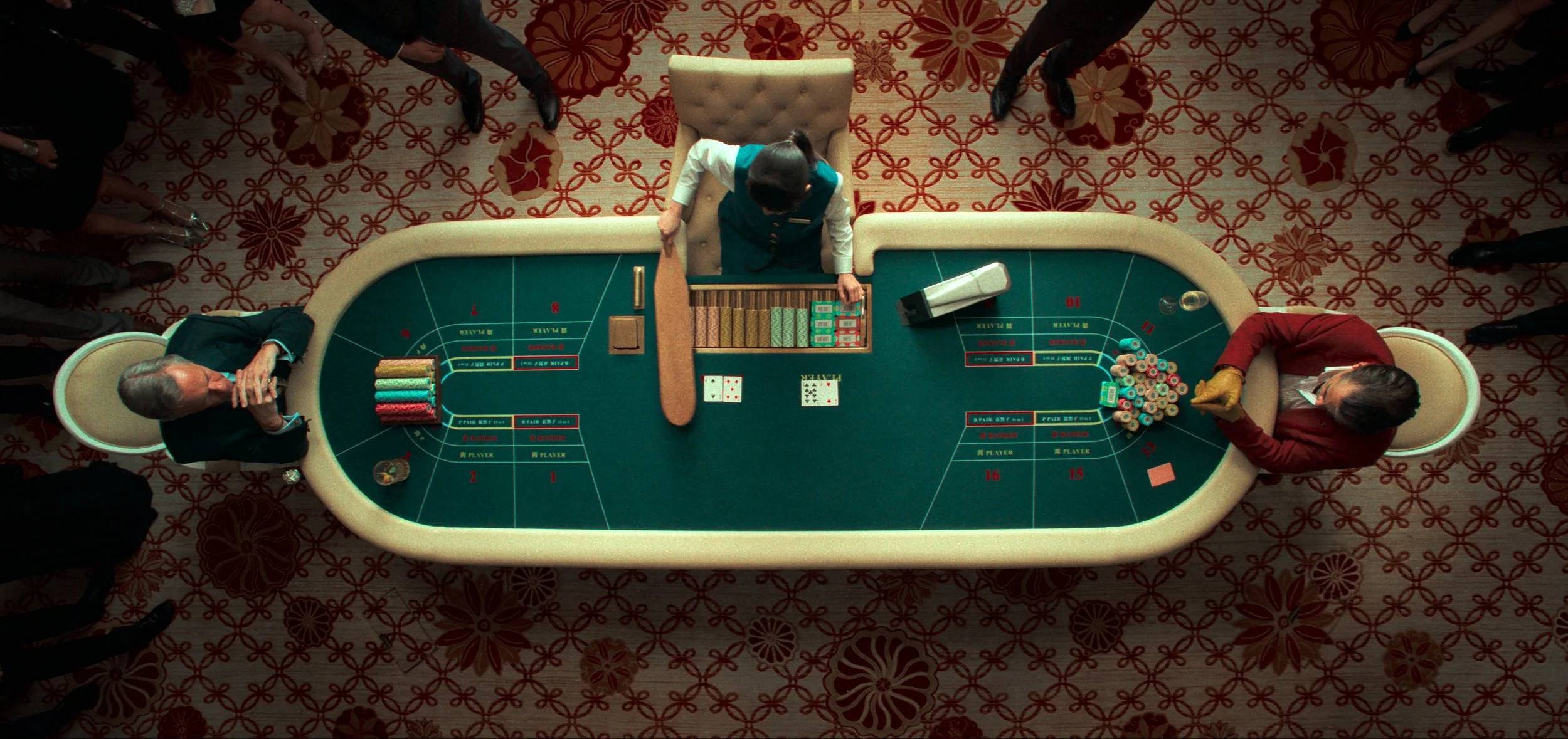‘Ballad of a Small Player’ Review: Colin Farrell Gambles Big in Edward Berger’s Stylish but Soulless Noir
Colin Farrell in 'Ballad of a Small Player.' Courtesy of Netflix
Edward Berger’s neon-lit morality tale dazzles in form but falters in feeling, as Colin Farrell delivers a magnetic performance in a film too entranced by its own emptiness to find the humanity beneath.
There’s an old gambler’s saying that every losing streak eventually circles back to zero — a cosmic balancing act where fortune and ruin cancel each other out. In Edward Berger’s Ballad of a Small Player, that idea isn’t just a theme; it’s the film’s haunting design. Adapted from Lawrence Osborne’s novel and anchored by a mesmerizing Colin Farrell, Berger’s latest unfolds like a fever dream of money, memory, and moral decay, where every roll of the dice edges closer to existential collapse.
Farrell’s Lord Doyle — if “Lord” is indeed his real title — is a broken English aristocrat hiding from creditors, scandals, and himself in Macau’s casino underworld. Once a charming socialite, now a compulsive gambler drowning in silk shirts and self-delusion, Doyle lives in the kind of lavish isolation that only total ruin can afford. When we first meet him, he’s down to his last few chips, wandering casino floors bathed in toxic neon, murmuring to himself like a man rehearsing his own eulogy.
Berger, whose Oscar-nominated All Quiet on the Western Front established him as a master of tone and visual dread, turns Macau into a purgatorial labyrinth — part In the Mood for Love, part Leaving Las Vegas, all filtered through the emotional precision of a filmmaker fascinated by despair. The film’s cinematographer, James Friend, captures the city like a mirage: flickering lights reflected in sweat and champagne, faces warped in roulette wheels and glass partitions. Volker Bertelmann’s thunderous score throbs beneath it all, more requiem than rhythm.
Colin Farrell in 'Ballad of a Small Player.' Courtesy of Netflix
It’s a stunning canvas, and Farrell paints on it with restraint and ruin. His Doyle is not a man seeking redemption but a man trying to delay recognition. Farrell makes that denial hypnotic — an ache disguised as charm, a smirk that barely conceals terror. The actor’s natural charisma becomes the film’s great illusion; you keep watching because he’s impossible not to, even as the story around him offers diminishing returns.
Doyle’s self-imposed exile plays like a performance he can’t stop giving. He orders champagne he can’t pay for, flirts with strangers who remind him of better days, and gambles on every table as if each loss might bring him closer to absolution. His reckoning arrives not with violence, but with grace — in the form of Dao Ming, played by the quietly luminous Fala Chen. She’s a casino hostess with her own debts, her own ghosts, and an inexplicable compassion for a man who’s done nothing to deserve it.
When Dao Ming takes pity on Doyle after catching him attempting to dine-and-dash on an obscene bottle of Cristal, their connection feels at once fated and foolish. She tells him it’s “not too late” to change, though it’s clear she doesn’t believe it either. Their relationship evolves through glances more than dialogue — two lonely people orbiting each other, both searching for something that’s already gone. Chen’s performance is warm and grounded, but her character is frustratingly underwritten. Berger gives her presence but not perspective, reducing Dao Ming to a vessel for Doyle’s redemption rather than a soul navigating her own.
Tilda Swinton, meanwhile, slithers into the film like an avenging specter. As Cynthia, the investigator tracking Doyle across continents, she’s more omen than antagonist — the embodiment of the past catching up. In her brief but potent scenes, Swinton radiates the quiet menace of inevitability. She doesn’t need to raise her voice; she is the film’s gravity.
Tilda Swinton in 'Ballad of a Small Player.' Courtesy of Netflix
Supporting turns from Deanie Ip, as a vulgar and hilarious high-roller grandmother who calls Doyle “a man I could crush like a shrimp,” and Alex Jennings, as an old acquaintance from Doyle’s London days, inject moments of tonal elasticity. Berger occasionally lets humor slip through the gloom, particularly in the casino sequences, where Doyle’s desperate antics provoke both pity and perverse laughter.
And yet, Ballad of a Small Player never quite decides what story it wants to tell. Berger and screenwriter Rowan Joffe sketch an atmosphere of moral ambiguity, but the film’s narrative — part thriller, part fable, part addiction drama — feels thin and directionless. For all its visual grandeur, the script lacks a heartbeat. Doyle’s voiceovers, lifted from Osborne’s prose, promise introspection but deliver only abstraction. “Here, I barely exist,” he tells us early on. “Here, I am whoever I want to be.” It’s an elegant sentiment that the film never challenges or deepens; Doyle’s identity remains as hollow at the end as it was in the beginning.
Berger’s direction, meticulous to a fault, often mistakes artifice for meaning. Each shot is composed like a postcard from purgatory, but the emotion feels engineered. The film’s aesthetic borrowings — Wong Kar-wai’s lush melancholy, Nicolas Winding Refn’s electric palette, even flashes of Sofia Coppola’s decadent ennui — are impeccably executed but derivative. What’s missing is the raw pulse beneath the polish.
Colin Farrell in 'Ballad of a Small Player.' Courtesy of Netflix
Still, it’s impossible to dismiss a film this carefully constructed. Berger knows how to make despair cinematic. The production design, by Andrew Laws, turns hotel rooms and back alleys into cathedrals of guilt. Lisy Chrisl’s costumes — all garish silks and cheap luxury — become visual metaphors for Doyle’s decay, while Friend’s camera lingers on mirrors and windows until reflection itself feels like a form of punishment.
When Ballad of a Small Player works, it works because Farrell wills it to. His performance is a masterclass in quiet collapse. The actor has built his late career on the art of restraint — from The Banshees of Inisherin to After Yang — and here he channels that gift into something almost tragicomic. His Doyle is part ghost, part grifter, unable to stop performing his own downfall. You can’t help but root for him to change, even as you know he won’t.
The film’s final act gestures toward transcendence — a rain-soaked revelation, a possible rebirth — but the catharsis feels imposed rather than earned. Doyle’s redemption hinges on chance rather than change, divine luck instead of human reckoning. It’s an ending that fits the film’s fatalistic worldview, but not its emotional promise. Like the gamblers who haunt its casinos, Ballad of a Small Player keeps betting big on surface pleasures while folding on depth.
For Berger, coming off the critical triumph of Conclave, this feels like a curious detour — an experiment in mood over meaning. There are flashes of brilliance throughout: a montage of Doyle’s hallucinations, half-dream, half-confession; a late-night walk through Macau where the sound design dissolves into waves and static, evoking a man fading into myth. But the narrative never coalesces. It’s a film about emptiness that too often succumbs to its own.
POPULAR ON THE CINEMA GROUP
Perhaps that’s the point. Osborne’s novel was always more about atmosphere than plot — a character study of privilege and addiction, of the colonial hangover that lingers in places like Macau, where Western men go to disappear and imagine themselves reborn. Berger visualizes that decay beautifully, but never interrogates it. Doyle’s cultural and moral dislocation becomes set dressing rather than subject. The result is a movie that feels like a ghost story without a haunting — gorgeous, melancholic, and inert.
Colin Farrell in 'Ballad of a Small Player.' Courtesy of Netflix
At its core, Ballad of a Small Player is a film about people trapped by the illusions they sell themselves. Doyle’s tragedy isn’t that he loses everything; it’s that he never stops thinking he can win it back. His charm becomes his curse, his wit his weapon, his self-awareness his shield. Farrell makes you feel every flicker of hope, every relapse of ego, every fleeting moment of grace that curdles into regret. It’s an extraordinary performance stranded in an ornamental movie — a man drowning in meaninglessness, surrounded by beauty that can’t save him.
In the end, Ballad of a Small Player lives up to its title — a tale of small victories and big delusions, played out in an empty paradise of glass and gold. Farrell’s brilliance reminds us what cinema can do; Berger’s detachment reminds us how easily that magic can slip away. The film glitters like a jackpot no one wins — bright, beautiful, and fleeting as a spin of the wheel.
Rating: ★★★★☆
That's A Wrap
|
Ballad of a Small Player
|
That's A Wrap | Ballad of a Small Player |
“Colin Farrell gives a career-best performance in a film that mistakes atmosphere for insight — a gorgeously empty meditation on greed, guilt, and ghosts..”
CREDITS
Release Date: Wednesday, October 15 | Theaters
Streaming: Wednesday, October 29 | Netflix
Cast: Colin Farrell, Fala Chen, Tilda Swinton, Deanie Ip, Alex Jennings
Director: Edward Berger
Writers: Rowan Joffe, based on the novel by Lawrence Osborne
Out Now: Streaming on Netflix
Rating: R












![Sundance 2026 Recap [Part i]
Another Sundance in the books. Last one in Park City— premieres, portraits, and the people who made it.
More to come!
📸: @jonathanpmoustakas on @sonyalpha
#sundancefilmfestival #sundance2026 #thecinemagroup](https://images.squarespace-cdn.com/content/v1/65c1a54efb10480185732c60/1770112011067-GAUJ8WUARIG299C1YW9J/image-asset.jpeg)














